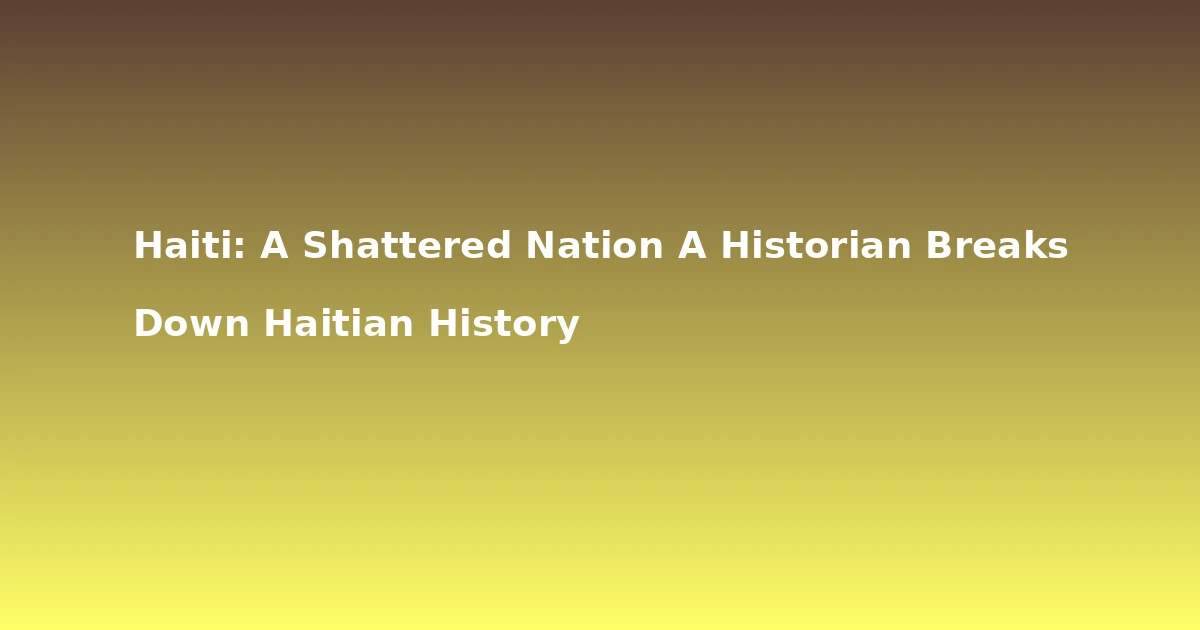Besides being a highly respected professor at the University of Wisconsin Milwaukee, and the author of several involved volumes such as the Humanities Press publication In the Shadow of Powers: Dantѐs Bellegarde in Haitian Social Thought, Dr. Patrick Bellegarde-Smith has yet another mark to distinguish him.
He is the grandson of noted intellectual, author, diplomat, Haitian militant Dantes Bellegarde and the grand nephew of Argentine Bellegarde, one of Haiti’s most influential educators of the nineteenth century.
Bellegarde-Smith is a sought-after lecturer and expert, in addition to being regarded as one of the foremost experts in the field of African diasporic social thought, religion, and philosophy (he is the editor of the book Fragments of Bone: Neo-African Religions in a New World).
Born in Haiti, Bellegarde-Smith lives and teaches in the United States, but it’s almost as if he never left. The bulk of his published books center on Haiti, and his title Haiti: The Breached Citadel, which the professor and thought tank reissued in the early 1990s, is one of the most referred-to books written about Haiti.
Q & A
At which point did you leave Haiti?
I left my country right before my 17th birthday in 1964. I would return twice a year, then once a year. As my grandparents died, then as my aunts and uncle died in succession, my visits became more rare and intermittent.
What do you remember about it?
Everything! The Port-au-Prince I knew in the late 1940s into the 1950s was a splendid city of green gardens and bountiful water. There were fountains in the Champs de Mars, and the Bicentenaire [Haiti’s Bicentennial Plaza] the latter in front of the Palais Legislatif, was a “singing” fountain with multicolored jets. It seemed odd that the music was European classical.
There were working telephones. And moments of unparalleled fear and shear agony as a young student at Petit-Seminaire College Saint-Martial, when I was sent to the blackboard to solve algebraic problems. My regular trips to Radio Haiti, participating in youthful programming, gave me a taste for journalism. I remember the cool oasis of my family lakou in central Port-au-Prince, at the junction of Lalue and Poste Marchand.
The home of the patriarch, which is now about 150 years-old, was surrounded by “new” constructions as daughters got married and built their homes in that same lakou, in the style of a provincial and rural lakou prominent throughout Haiti.
I have vivid memories of the slow disintegration of life under the dynastic Duvalier dictatorships, the disappearances of early teen classmates, their torture, their deaths and that of their older brothers and cousins. I remember the increasing poverty of the Bellegarde family, a slow descent, though as children, we were shielded from some of that knowledge.
My grandfather and his brood were surviving on less than $100 US, his pension for more than 50 years of service to the Haitian state. I remember the “exile” when my immediate family left in 1964 for Saint Thomas, U.S. Virgin Islands, in the footsteps of glorious Haitian statesmen, such as Antenor Firmin to the same shores, then the Danish Virgin Islands. The difficult trips back to the capital, as my family descended into despair and further impoverishment.
On each of my trips back, my cousins kept saying that my Kreyol was getting better, and that I was even more Haitian than when I left? Little that they knew that nan domi, my dreams were oftentimes of times past, and that the language I “spoke” was our national language, Kreyol.
I prefer to call the language “Haitian,” now that it has transcended its origins as a “creole.” My grammar and syntax were good, but I had not kept up with new vocabulary which often came from the United States, and from the English language. Some of the words I use, date from the mid-1960s.
So my français was becoming “surette,” and my kreyol was “pa fin yes.”
In a way, I am pleased that this interview is not conducted in French or in Haitian! I could do it, but it would be painful to reveal an antiquated vocabulary though the grammar would be stellar, if I may say so myself!
Patrick Bellegarde-Smith at College St. Martial, one of Haiti’s most historically prestigious schools…1958-1959 school year. Bellegarde-Smith is the third child from the left in the fourth row..
was published in the [1990s] by you. Why “breached citadel?”
Breached Citadel was published in 1990 by Westview Press, an academic press, and an updated edition was published by Canadian Scholars Press in 2004. Why in Canada? Because my original publisher felt that the “tone” of the book was too “anti-American.”
Why is it that when you tell the truth about the United States, you are accused of anti-americanism? Is is perhaps because Americans have never been taught their own history, and their country’s dealings with the rest of the world?
The book was translated brilliantly in Spanish in Cuba as Haiti: La cuidadela vulnerada, and will soon be translated into Portuguese for the Brazilian market, as was my edited book with Dr. Claudine Michel, Haitian Vodou saw a Portuguese translation two years ago.
Why “breached citadel?” I was reminded of a statement made by Pope John-Paul II about Africa, “When left alone, Africa works.”
My choice of such a subtitle indicated that the foreign interventions and interference had crippled Haiti and were often nefarious, as these interventions were occurring on behalf of non-Haitian businessmen, or in favor of rapacious commercial and social elites that did not seem to have Haiti’s best interest at heart.
In fact, from the 1870s into 1880s and the 1890s, Haiti was descending into further underdevelopment. Presently, Haitian control of Haiti has further receded with 10,000 NGOs and the conscious and willful weakening of the state and its government by international fiat.
Left: Granps Louis-Dantes Bellegarde…the militant, the intellectual and man of state.
So, your grandfather Dantes Bellegarde, was like the quintessential Haitian bourgeois — a member of the Haitian elite for sure—not only in terms of family lineage, but also intellectual pedigree?
The only part of this difficult [statement] I agree with is “intellectual pedigree.” Indeed, Dantes Bellegarde had descended from men and women who had been significant in the history of Haiti. These individuals did not seem to become rich.
His maternal great-grandfather Jacques-Ignace Fresnel, considered the founder of Haitian Free-Masonry, was named judge by Emperor Jean-Jacques Dessalines, but his mother, the grand-daughter of Fresnel, was dirt poor and illiterate. She never went to school, never learned French. She had two sons out of wedlock, Dantes and Clement.
On Dantes’s father’s side, he was the great-grandson of Jean-Louis Bellegarde, who had served Emperor Faustin Soulouque. Jean-Louis Bellegarde was the contemporary of General Charles Oscar — the “chaloska” of carnival fame.
His aunt, whom he adored, was the rightly famous Argentine Bellegarde; he named his first daughter, Argentine in her honor. His cousin and his mother’s niece, was the family manbo who lived with them in their home in Port-au-Prince.
Dantes Bellegarde went to the public school of his neighborhood of Lalue, and to the public Lycee Petion, where he met his great and faithful friend, Jean Price-Mars. Price-Mars was the first visitor to our home when Dantes died on June 14, 1966.
My grandfather was rightfully proud of the service his forebears had provided the country, all of whom were patriots of the first order, the way he saw it.
Dantes Bellegarde was undeniably smart and lucky. He became Haiti’s best known diplomat in the 20th century bar none. He served Haiti in Paris, Geneva—at the League of Nations—in Washington, in New York at the United Nations.
I have written about all this in my “best” book to-date, In the Shadow of Powers (1985), which is now being translated into French as Dans l’ombre des grandes puissances. Bellegarde did not see himself as a “bougie,” as he defended Haiti’s honor, abroad at every turn.
He did, however, embody or personify the prevailing attitudes of the Frenchified “aristocracy.” Deeply mistaken at times in his ideological stance, he did not deviate from the straight line he had set for himself. He died relative poverty in his home, his “chanmòt,” in the rapidly declining neighborhood of Lalue where he was born.
He never wanted to move to the “suburbs!”
Do you remember the first time you were fully aware of your milieu? Knew like the importance of the people around you — and that you were related to this man, who had been so important to Haiti’s intellectual circle?
As a child, living in a poor neighborhood, I was deeply aware of Haiti’s class system and horrid color divisions in the country. Anyone with half a brain realized that the situation was “not right.” I rebelled at an early age, and befriended young people from a variety of “milieu” as you put it.
I was aware of my condition, of my pale complexion, with “bad hair,” which landed me the nicknames and monikers of “blan mannan [white dimwit],” and “ravèt blanch [white cockroach].” As a child, I did not want to eat corn flakes, but Akasan, and green plantains bouyi, and aran sò and griyo.
Now in the U.S. Midwest, I cook these foods for myself. I became aware of my grandfather’s stature when he received an unending flow of Haitian and foreign dignitaries.
And when I used his voluminous library for my homework. And when he helped me with my homework, my “thèmes d’imitation,” and “versions” in Ancient Greek and Latin lessons. Ancient Greek and Latin helped me immeasurably when it came time for me to learn English.
Above: Patrick Bellegarde-Smith at his folk’s place in Port-au-Prince in 1962. No music posters for this fourteen-year-old.
As a Bellegarde seed, do you feel that you have to uphold some sort of legacy?
The legacy I’m upholding is not specifically as the descendant of Dantes Bellegarde, Argentine Bellegarde, or Jacques-Ignace Fresnel—the first minister of Justice, and founder of Haitian Free-Masonry—but as Haitian, son of intellectual “giants”—that includes my grandfather.
Since a child, I was imbued with Haitian history, part of which I learned at my grandfather’s side. I was blessed to have had stellar Haitian history teachers, namely Ernst Trouillot and Père Antoine Adrien at Seminaire College Saint-Martial.
Did you fully grasp your family’s historical and overall importance?
Since I was a child. We discussed Haitian history, politics, literature, international events almost daily in Port-au-Prince, during the blackout that was beneficial to enormous interaction between the younger Bellegardes and the older generation. People in the street, and at school, remind me of the historical significance of my forebears as well. People recognized me because of my facial features and my profile, unique to the Bellegardes.
You wrote about your grandfather.
I just did, and at some length. My book which is an intellectual biography of my grandfather and an analysis of Haitian social thought in the 19th century is coming soon, published simultaneously in Montreal and Port-au-Prince.
It is also very true that Louis-Dantes Bellegarde became the epitome and represented the Haitian bourgeoisie at its best, though I would say he represented the intellectual elite more than the bourgeoisie of his time. He was a sort of natural aristocrat, more aristocratic than bourgeois.
His excellent education was acquired entirely in Haitian schools — as he emphasized constantly — and his profound sense of patriotism enraged the United States. But when Haitian intellectuals moved “left,” with the Indigenous movement. there was a rapprochement to the political views of the United States, when Bellegarde feared international communism.
So, the end result was that Bellegarde, though not Jean Price-Mars who came from the same font as him, became the ultimate bourgeois in the minds of successive generations of Haitian thinkers, as he represented liberalism in its pure late 19th century form.
His greatest “sin” was to see his country best served by a European model of cultural development, disregarding the African and “creole” foundations of Haiti’s national culture.
I am reminded of a Vodou saying, “Si kreyol twonpe Ginin, se Ginin ki vle.” We should not be so quick to judge, and see women and men in the optics of their time.
Am kinda curious about how you felt the last time you went to Haiti?
The poverty has increased, and I do not see how we are going to get out of this predicament. Haitians deserve much better. We are still being punished for what we did in the 1790s. We are a smart people, full of verve.
The more we “integrate” into the global system, the worse the situation seems to become for Haiti. There is not a “one to one” connection here, but it seems that way. Haitians and their government need to control Haiti, not the 10,000 NGOs who parade as they please, with no seeming coordination, and outside Haitian control.
This is not the definition of sovereignty, this is rather abject dependence. This is not what Dessalines and 500,000 Haitians had fought for. This is not why 100,000 Haitians died for in 1791-1806.
Above: Marie Bellegarde posing with Franck Lavaud, a captain of Haiti’s Armed Forces. Of her Bellegarde-Smith says: “My aunt Marie had married a co-founder of a political party that became the Haitian Communist Party, with the most famed Haitian novelist Jacques Roumain.
Her ex-husband, Max L. Hudicourt, a senator, was murdered. Family lore has it that he was dispatched by the U.S.
government. Upon divorce, women reclaim their birth name. She was also a co-founder of the first big women’s organization in the country, the elite-led Ligue Feminine d’Action Social.
She was a graduate of the Ecole Normale in Port-au-Prince, the only post-secondary school opened to women at that epoch in the 1920s. We called her simply Tante Mayotte. We all get nicknames in the Äfrican world.”
Argentine Bellegarde was a trailblazing educator. What more can you tell us about her?
Argentine Bellegarde helped raise young Dantes. He adored his aunt, and she adored him.
She was at his side when he was growing up. His named his first daughetr born in 1902 after Argentine.
We called her “Tante Nine,” and her friends and relatives called her “Titine.” Perhaps the most poignant piece of writing Dantes Bellegarde did, was at the death of his beloved aunt.
You will find part of that statement in my book, In The Shadow of Powers, and a photo of my “Tante Nine” in my Breached Citadel. She had a pied-a-terre in Arcahaie, the cradle of the Bellegarde family.
If your grandfather were alive today, he’d be 100+ years old, and what do you think he would say, and think of Haiti at the moment?
I am glad he is dead. If he were living at 136 years old, he would probably think of committing suicide, and who could blame him?
After his last diplomatic post as Ambassador to the United States and to the Organization of American States in Washington at 80, he came back home and became a recluse in his lush gardens in central Port-au-Prince, one block away from the Palais National.
He seldom left home after his retirement. He rejected invitations to travel abroad, certain that he would not be allowed back by Francois Duvalier. He wanted to die in his country, which he did nine years later in his bed, at home.
Obviously you’re doing your part to carry on your family’s legacy. Who do you think would be the equivalent of your grandfather today?
I am sorry to say, I see no equivalent, though Haiti retains a lot of talented people in many fields of endeavors.
Dantes Bellegarde remains the most important Haitian diplomat of the 20th century, for instance.
His scholarship is gaining ground, however, seen by some as a “rectification” of the excesses of Duvalierism and “noirisme.” Jean Price-Mars, whose work was denatured by some of his followers, remains my hero. I had a chance to discuss this with Dr. Louis Mars, who was closer to my grandfather than to his own father.
Bellegarde-Smith with a fellow seed of Haiti’s intelligentsia, Dr. Louis Mars, son of Jean Price Mars.
What period of Haitian history do you find most fascinating?
As a historian and a political scientist, every period where there is a half chance for Haitians of turning Haiti around, fascinates me. To be brief, the period after the Revolution of 1791 leading to independence, until about 1880 or so.
The period of the Centenary in 1904 where Haitians were once more, hopeful. The period of the presidency of Dumarsais Estime, my favorite president…Then, the departure of the Duvaliers in 1986. I keep hoping against hope.
The people, not the elites, must control their destinies, but “power concedes nothing without a struggle,” as aptly said by Frederick Douglass who was the second United States diplomat in Haiti in the 19th century. I cannot say that there is no hope to our children. To them, I say kinbe rèd pa lage.
Be sure to visit Dr. Bellegarde-Smith’s page
Photo Credit: All photos provided by subject except for black and white Dantes Bellegarde photo; .
Last Updated on December 4, 2025 by kreyolicious



